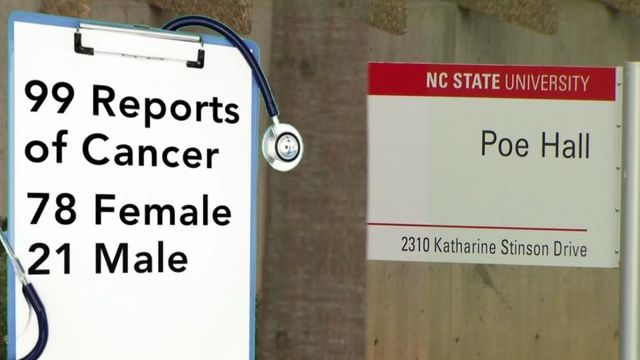More than 100 people who spent time in Poe Hall report cancer diagnosis to WRAL
WRAL 5 On Your Side has independently received 101 reports of cancer and more than a dozen other reports of serious illness in people who spent time in Poe Hall.
The previously busy building, home to North Carolina State University's College of Education and Psychology Department, closed in November after testing revealed high levels of PCBs, toxic chemicals linked to cancer.
In the past week, several NC State employees have written to NC State leadership and the North Carolina Department of Health and Human Services, imploring both entities to investigate the cases of cancer and serious illnesses, according to email records sent to 5 On Your Side. Both have declined for now. Instead, the university says it is focused on an environmental study of the building.
November 2023: Poe Hall closes, health investigation requested
A little more than a week after Poe Hall closed in November, the NC Department of Health and Human Services said it recommended NC State request a Health Hazard Evaluation. NC State did so, according to both NCDHHS and the CDC.
“(NCDHHS) typically refers questions about increased cancer incidence in occupational settings to the National Institute of Occupational Safety and Health, since they are better situated to assist with investigating cancer concerns through a health hazard evaluation,” a spokesperson with NCDHHS wrote to WRAL 5 On Your Side.
The free federal investigation conducted by The National Institute of Occupational Safety and Health (NIOSH) had the ability to conduct medical exams, review reports of illness, and collect samples. But in January 2024, the investigation was called off. Who is responsible for that decision is in dispute.
January 2024: CDC evaluation can't proceed without NC State support
The CDC told WRAL 5 On Your Side that NC State’s general counsel withdrew its request for evaluation in January.
“NCSU’s general counsel withdrew the request in January 2024,” according to a statement from the CDC, of which NIOSH is a part.
The CDC confirmed two separate Health Hazard Evaluation requests regarding Poe Hall. One from NC State and one from a group of NC State employees who worked in Poe Hall.
However, according to the CDC, NIOSH couldn’t conduct either without NC State’s involvement. The CDC wrote that NIOSH does “not have the authority to proceed with its evaluation without the cooperation of NCSU.”
In a letter titled “closeout," detailing their inability to move forward with the investigation, Dr. Dallas Shi, a NIOSH official, wrote: “I explained that the North Carolina State University’s Office of General Counsel has asked us to stop our evaluation.”
Shi’s letter noted the frustration of one of the NCSU workers who participated in the second request for the evaluation. “The requestor expressed concerns over a lack of communication and general distrust in management’s actions. They also expressed concern about a lack of epidemiological analysis. I offered to relay these concerns to the North Carolina State University’s Office of General Counsel in a confidential manner,” Shi wrote.
Read the statement from CDC and the letter from NIOSH here.
Feb. 2024: CDC, NC State at odds over who canceled evaluation
NC State takes issue with the CDC saying NC State withdrew its request for a Health Hazard Evaluation.
In a statement to the NCSU community Chancellor Randy Woodson wrote that it was not NSCU’s choice to pull out of the HHE.
“At no time has NC State requested that NIOSH close any HHE (Health Hazard Evaluation), and I’m reaching out to respectfully request a retraction of any statement to the contrary,” Todd S. Roessler wrote to the U.S. Department of Health and Human Services.
On Feb. 6, Roessler, an attorney who explained he was working on behalf of NC State, wrote a letter to U.S. DHHS focusing on the statement from the CDC about the request to withdraw and the series of events which lead to the end of the Health Hazard Evaluation.
“NC State informed NIOSH that Poe Hall remained closed,” Roessler wrote about a phone call which took place on Jan. 18.
NC State told NIOSH the building was only open to properly trained personnel, “with appropriate personal protective equipment for essential activities, i.e., sampling, repairs, maintenance,” according to Roessler’s letter.
WRAL 5 On Your Side has asked NC State to clarify if that meant it would not let NIOSH in the building.
NC State officials say it was first focused on an environmental study of Poe Hall and would use that information to inform any health investigations.
“NC State … let NIOSH know we were pursuing an environmental investigation on the building to better inform any needed health investigations,” Mary Cole Pike, an NC State spokesperson, wrote in an email to 5 On Your Side.
NC State says NIOSH then told the university it wanted to move forward with the investigation at the same time as the building investigation or close it.
“The agency (NIOSH) let the university know that it preferred to either keep evaluations open or closed rather than pausing while the building investigation was conducted,” Pike wrote.
NC State officials say it was ultimately NIOSH’s decision to close the Health Hazard Evaluation.
“Based on the information provided by NC State, NIOSH closed the HHE,” Pike wrote.
NC State says it may open a health evaluation, but it is currently testing the building. The investigation is being conducted by Geosyntec Consultants, a consulting firm it hired.
Link to the letter sent on behalf of NC State to the US Department of Health and Human Services.
NC State employees, students ask the state for help
NCDHHS confirms it has the authority to investigate, but is not: “It is our understanding that NCSU is taking action to protect public health, including notifying staff about concerns, closing Poe Hall, and consulting with an outside environmental expert to initiate remediation of the building,” a spokesperson with DHHS wrote.
Several NC State employees and students have emailed DHHS Secretary Kody Kinsley and Deputy Secretary Jay Ludlam asking for DHHS to get involved.
“A wide-sweeping health assessment needs to be done to ensure students, staff, and faculty who worked and learned in Poe know how to manage their own health,” one former grad student with noncancerous health issues wrote in an email to Kinsley and Ludlam.
Chancellor Randy Woodson updated the NCSU community on Wednesday. He reaffirmed an environmental investigation at Poe Hall, telling the NC State community that the university is seeking answers about the building with health concerns in mind.
NC State University tells WRAL News that it is not collecting health information. NC DHHS says it is not investigating Poe Hall. The CDC confirms that federal agencies focused on human health are not investigating Poe Hall. NC State hired a consulting firm to focus on environmental testing last year.
What’s next for Poe Hall students, employees
NC State says it may investigate the health of people who worked and studied in Poe Hall later.
“We’re waiting for the results of the environmental study and recommendations before conducting any additional investigations,” Mary Cole Pike wrote to 5 On Your Side.
NCSU students and employees continue to push for faster action. A student petition asked NC State to immediately reopen a request for a health hazard evaluation. On Friday, the college coordination committee is holding a meeting to consider a motion to hold separate votes on no-confidence for NC State’s Chancellor, Vice-Chancellor, and Education Dean.
“The committee has received several emails expressing concern and dismay at the lack of communication and transparency from leadership at the university in regard to the ongoing investigation into Poe Hall,” the college coordinating committee wrote to the department of teacher education and learning sciences.
“We feel that it is imperative that we convene a meeting as soon as possible to discuss this matter and collectively decide our best course of action going forward,” continued the message.
A vote of no confidence would be largely symbolic as faculty do not have the power to remove university leaders from office through this vote, according to an email sent from the committee to WRAL 5 On Your Side. To read the full report click here.
Some faculty members took issue with the call for the vote, saying it was unwise to rush to blame.











